Planetary Urbanisation / Agrifutures Zürich: Exhibition at ZAZ Bellerive: Zentrum Architektur Zürich 06th October- 17th December 2023 — Extended until 24th January 2024
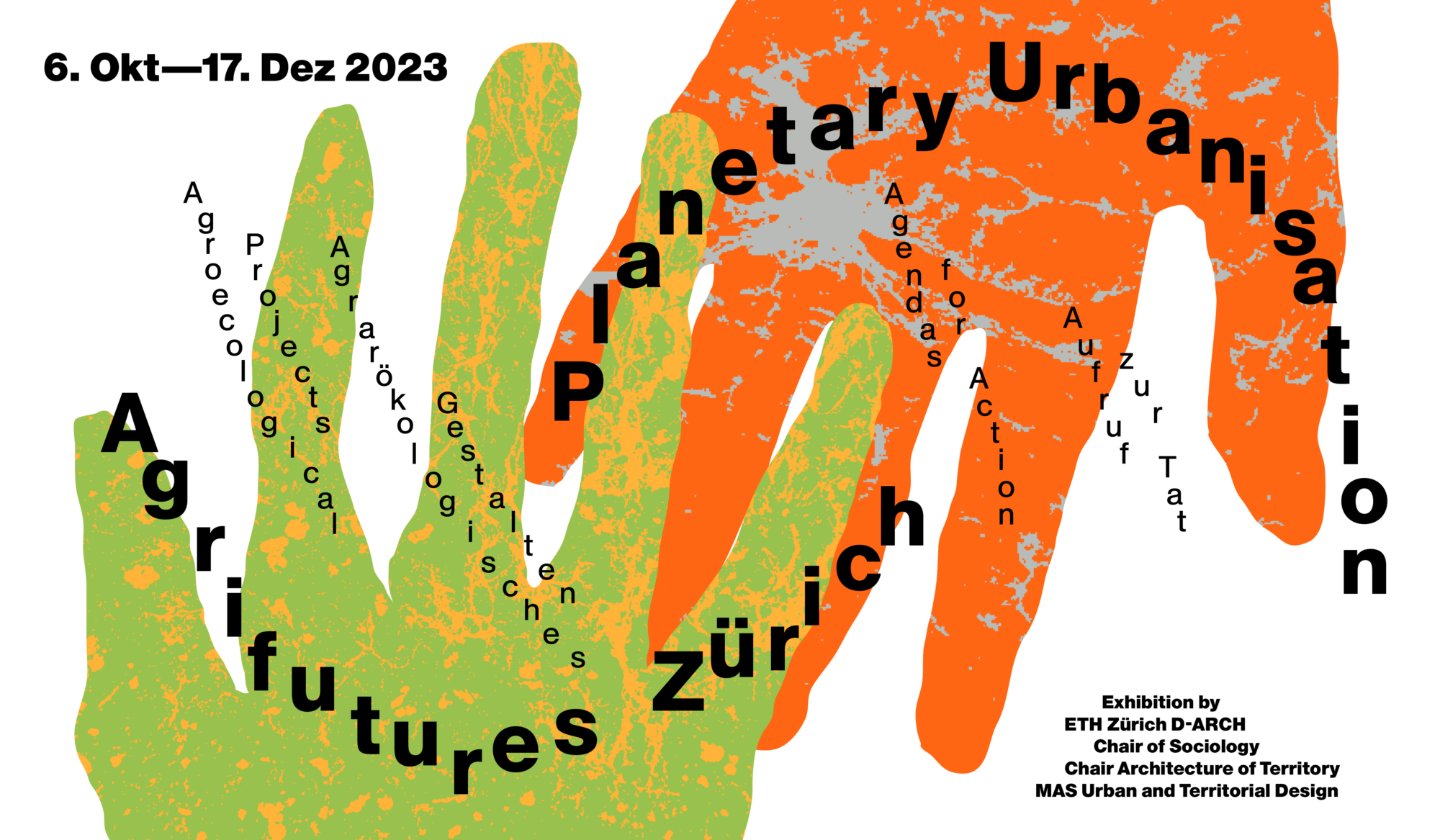
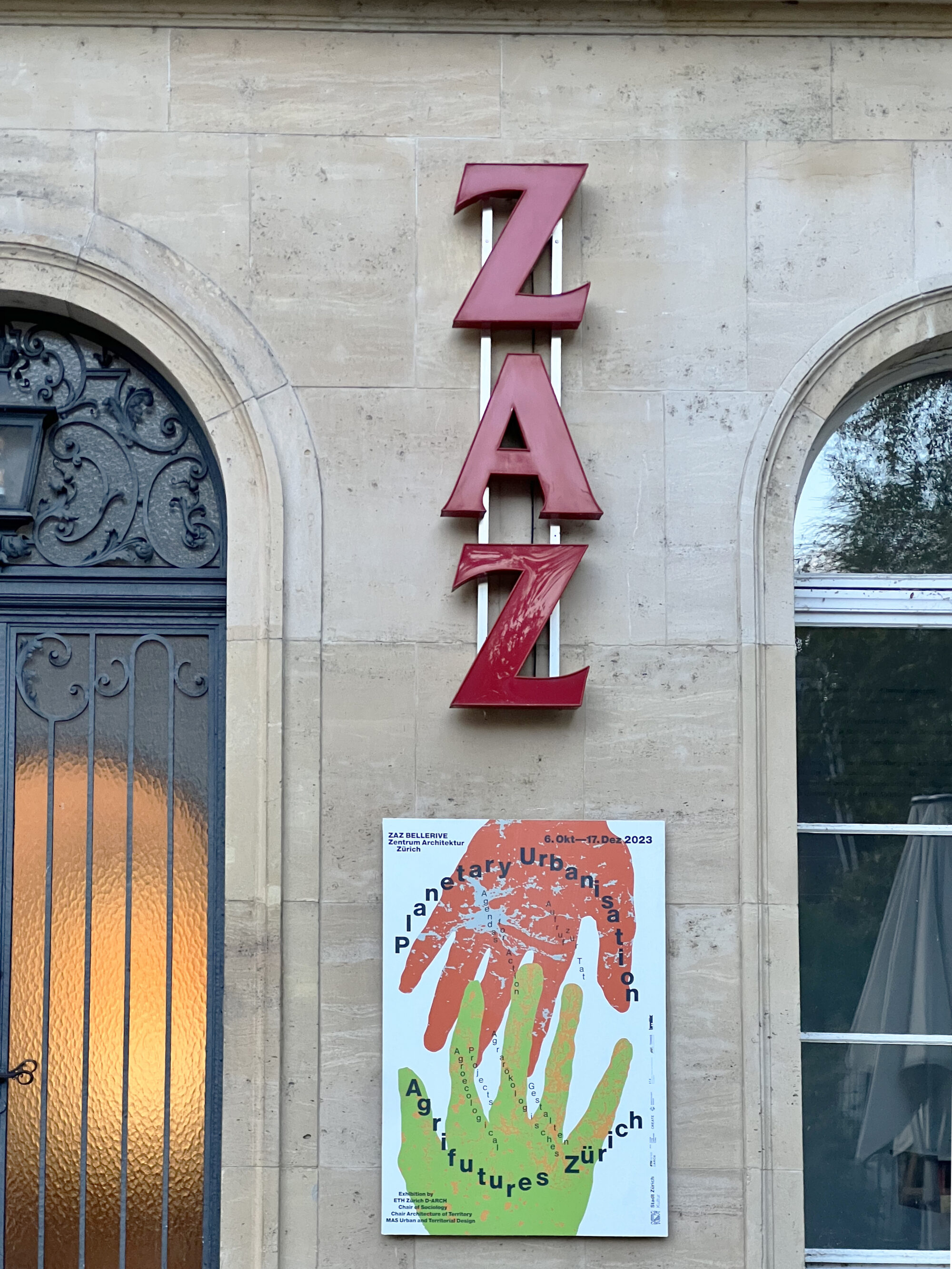
ZAZ BELLERIVE Zentrum Architektur Zürich
Urbanisation processes are profoundly transforming the Earth. They are producing manifold planetary crises that demand attention and urgent action. The exhibition captures these crucial challenges through cartographic representations, photographs and films, resulting from long-standing collaborative research conducted at the Department of Architecture at ETH Zürich. The exhibition is organised in two thematic strands.
Planetary Urbanisation focuses on sixteen metropolises and peripheral regions. It offers new concepts and cartographies of urbanisation processes, traces struggles against their devastating effects, and proposes agendas for collective action.
Agrifutures Zürich presents approaches to sustainable food production, alternative to ongoing agricultural intensification. Agroecological design visions describe Zurich’s future food region based on ecological farming, cooperativism, and commoning.
| Location | ZAZ BELLERIVE Höschgasse 3 CH-8008 Zürich |
| Dates | 6 October – 17 December 2023 |
| Events | 05th October 2023, 7:30 pm Exhibition Opening 18th October 2023, 6–7:30 pm Dual Book Launch "Extended Urbanisation: Tracing Planetary Struggles", edited by Christian Schmid and Milica Topalović, and "Vocabularies for an Urbanising Planet: Theory Building through Comparison", edited by Christian Schmid and Monika Streule. 18th–20th October 2023 NSL Colloquium Planetary Urbanisation — Agendas for Research and Action brings diverse voices and scholarly insights from more than thirty international urban studies, architecture and landscape speakers. 1st–31st October 2023 Tage der Agrarökologie The contribution of Agrifutures Zürich is part of the Tage der Agrarökologie 2023, which offers events on agroecology throughout Switzerland. The initiative aims to bring agroecology and its many aspects closer to the public. 27th October 2023, 2–4 pm Agrifutures Zürich with Designers Graduates and faculty members from ETH Zürich and EPFL's MAS in Urban and Territorial Design program invite the public to a tour of their exhibition showcasing their agroecological design visions for the Zürich region. |
| Concept and Production | Christian Schmid, Milica Topalović (lead), Karoline Kostka (co-ordinator), Nitin Bathla, Alice Clarke, Nancy Couling, Caroline Ting, in collaboration with ZAZ BELLERIVE |
| Further information | www.zaz-bellerive.ch www.mas-utd.arch.ethz.ch |
Today, the entire planet is affected by urbanisation, from large metropolises and agglomerations to remote rainforests, desert zones and oceans. Urbanisation processes have acquired a planetary reach and require a planetary perspective to be adequately understood. The exhibition analyses these processes in diverse contexts and world regions. On the one hand, it examines processes of concentrated urbanisation in large metropolitan regions and on the other, the interconnected processes of extended urbanisation in territories located far beyond these regions.
Vocabularies for an Urbanising Planet presents investigations of patterns and pathways of concentrated urbanisation in eight of the world’s largest metropolitan territories, characterised by massive population growth and rapid urban change. As urban areas expand and interweave, new urban configurations are evolving that have manifold consequences for the quality of life of their inhabitants. The research team brought different urban experiences together in a comparative analysis and developed a new vocabulary of urbanisation that helps us better understand the effects of these developments.
Territories of Extended Urbanisation presents investigations of urbanisation processes in ten remote and sparsely settled areas that supply food, water, energy and raw materials to agglomerations and metropolises. The research team analyses how these processes are producing planetary social and ecological crises as well as tracing manifold struggles against these developments.
This research was carried out over the last twelve years at the ETH Future Cities Laboratory in Singapore and the Department of Architecture at ETH Zürich.
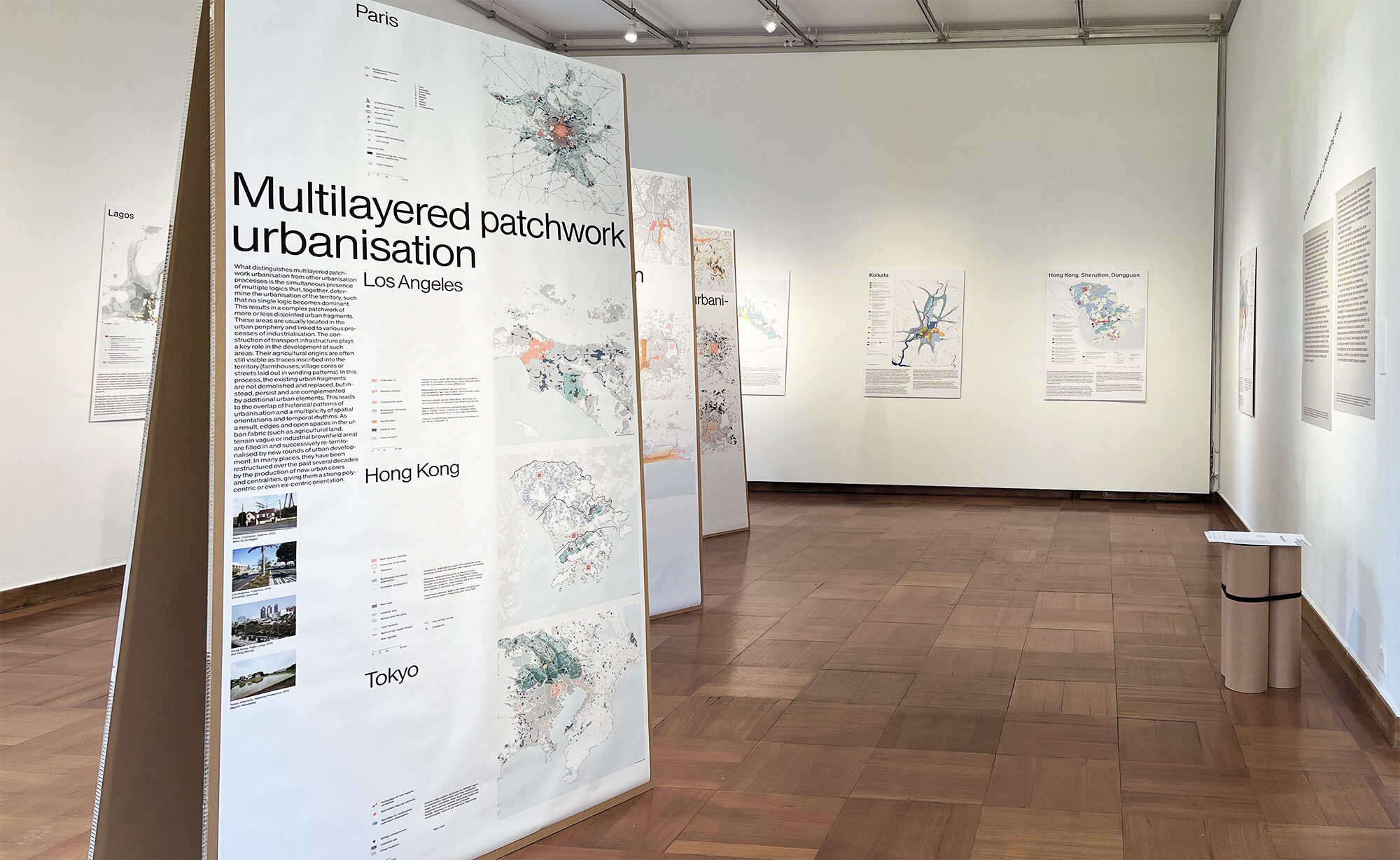
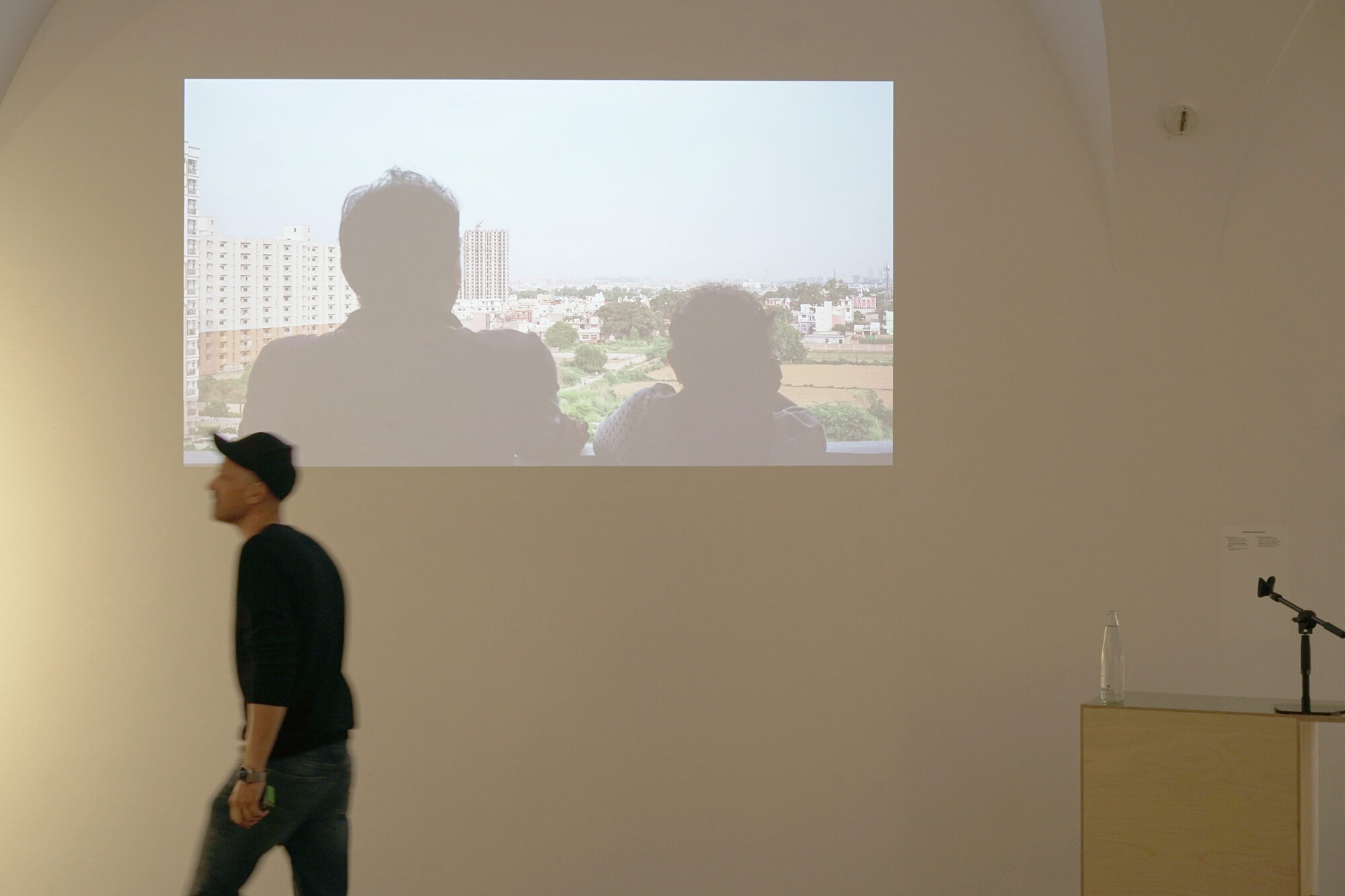
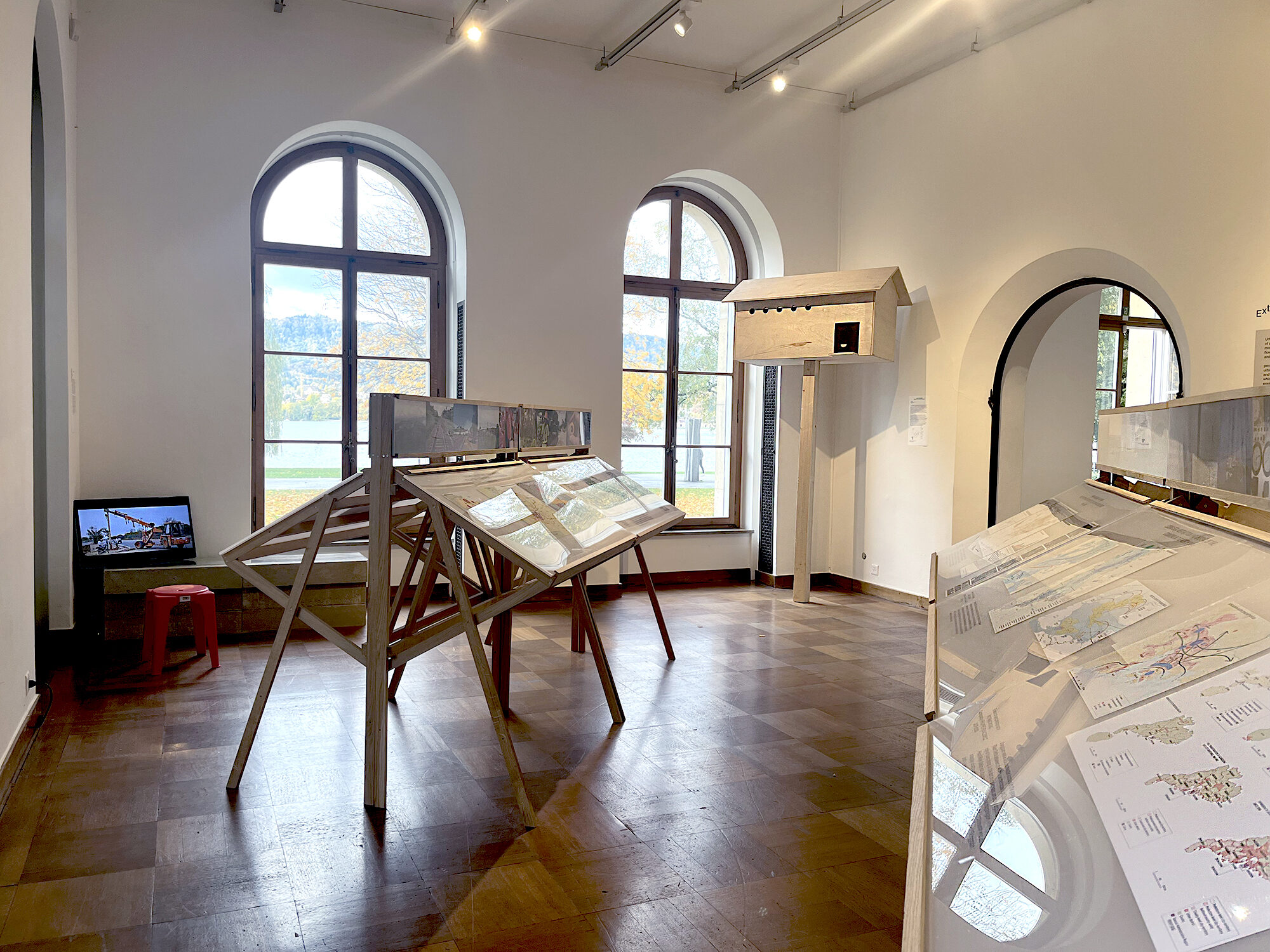
Vocabularies for an Urbanising Planet
The urban world has fundamentally changed in the last few decades. New urbanisation processes have generated complex and often surprising territories, which have unsettled conventional conceptions of the urban. To better understand the problematics and challenges of contemporary planetary urbanisation, new concepts and terms are required.
This segment of the exhibition highlights the dynamics of urbanisation processes in large metropolitan territories in different parts of the world. The research team developed novel cartographic methods to better understand the socioeconomic and urbanistic structures of these territories. The large maps on the wall show that urbanisation processes have transformed metropolitan territories in different ways, and they reveal historically and geographically specific patterns and pathways of urbanisation.
By comparing the eight case studies, the research team discovered similarities among urbanisation processes in different territories. These comparisons helped the team to create a set of new concepts and terms of contemporary urbanisation processes. Based on detailed urbanistic, ethnographic and historical explorations, they systematically analysed the diversity of responses to urgent urban challenges and identified processes that have a number of common features and dynamics. These concepts can be applied to the analysis of other territories, and can thus help deciphering the rapidly changing urban situations and assess the practical consequences of different urban strategies for everyday life.
| Locations | Tokyo, Hong Kong, Shenzhen, Dongguan, Kolkata, Istanbul, Lagos, Paris, Mexico City, Los Angeles |
| Date | 2011–2023 |
| Research team | Lara Belkind, Naomi Hanakata, Pascal Kallenberger, Ozan Karaman, Anne Kockelkorn, Lindsay Sawyer, Monika Streule, Kit Ping Wong. Cartography: Dorothée Billard, Roger Conscience, Philippe Rekacewicz. |
| The research is published in Vocabularies for an Urbanising Planet: Theory Building Through Comparison, edited by Christian Schmid and Monika Streule (Birkhäuser, 2023). The maps at the wall are from the Shenzhen Biennale of Urbanism and Architecture, 2015. |
Extended Urbanisation
Urbanisation processes are unfolding far beyond the realm of agglomerations, profoundly transforming even the Earth’s most remote landscapes. Enmeshed in the metabolic flows and ecologies of life, they are propelling manifold social and environmental crises and demand collective action.
Understanding extended urbanisation demands a decentred perspective on the urban, transcending centre-periphery, urban-rural and north-south divides. New conceptions and cartographies of the urban beyond the city are required, which can integrate all spatial scales, built and non-built environments, and address all protagonists of urbanisation acting from both above and below.
In this segment of the exhibition, the research team portrays the unprecedented effects of extended urbanisation through transdisciplinary and transductive methods, including ethnographic fieldwork, photography and cartography. In conversations with food hawkers along the Lagos-Abidjan corridor, pastoralists in the Arcadian mountains, campesinos in Eastern Amazonia, workers on oil platforms in the North Sea, villagers in Dongguan and West Bengal, farmers in Iowa and Thailand, palm-oil smallholders in Malaysia, and inhabitants of subaltern settlements in Delhi, the researchers encountered growing political consciousness, struggles for self-determination, and in some cases organised political movements against the devastating impacts of extended urbanisation.
These case studies demonstrate that territories of extended urbanisation need to be re-embedded into bio-physical relations based on social and ecological justice. Alternatives to the politics of global apartheid embrace efforts to create reciprocities, international solidarity, and mutual understandings in social and ecological terms.
| Locations | Eastern Amazonia, US Corn and Soy Belt, North Sea, Arcadia, Lagos-Abidjan Corridor, West Bengal, Dongguan, India, Johor State, North-East Thailand |
| Date | 2017–2023 |
| Research team | Nitin Bathla, Elisa T. Bertuzzo, Rodrigo Castriota, Nancy Couling, Alice Hertzog, Hans Hortig, Hiromi Inagaki, Nikos Katsikis, Metaxia Markaki, Kit Ping Wong. Cartography: Naomi Hanakata, Hans Hortig, Hiromi Inagaki and Philippe Rekacewicz. |
| The research is published in Extended Urbanisation. Tracing Planetary Struggles, edited by Christian Schmid and Milica Topalović (Birkhäuser, 2023). Parts of the exhibition were shown at the Venice Architecture Biennale, 2021. |
Nearly half of the planet's total land area is dedicated to some form of agricultural production. The rationalisation, industrialisation, and urbanisation of agrarian territories are amongst the most severe processes affecting human well-being and ecosystems worldwide. Their effects include increasing dependence on fertilisers, pesticides and fossil fuels, depletion of soil fertility, water pollution, loss of biodiversity, commodification of land, displacement of people and destruction of livelihoods. In the past, these developments have received little attention in mainstream media, science and policy. Even in highly industrialised Switzerland, the rural was imagined as an idyllic antipode to a modern urban society, a pastoral refuge from industrialisation and the perils of urban life. The myth of the rural has concealed the dramatic transformations of agricultural territories affecting their human and non-human inhabitants.
Agrifutures Zürich presents an agroecological approach to landscape and territorial design for sustainable food production in the metropolitan region of Zurich. It offers alternatives to the prevalent trends of agricultural intensification through transformative social and ecological farming practices based on citizen involvement, cooperative organising and common pool resources. A large synthesis map of Zurich’s extended metropolitan region reveals an investigation conducted in the context of the New Agendas Under Planetary Urbanisation: Module Zurich, research project at ETH Future Cities Lab Global. It brings together the built and the non-built landscapes and invites visitors to reflect on ongoing agrarian transformations through urbanisation and potentials for change. Participants of the Master of Advanced Studies in Urban and Territorial Design at ETH Zürich present their visions for agroecological futures across diverse agricultural landscapes, from Zurich’s metropolitan centre to alpine pastures.
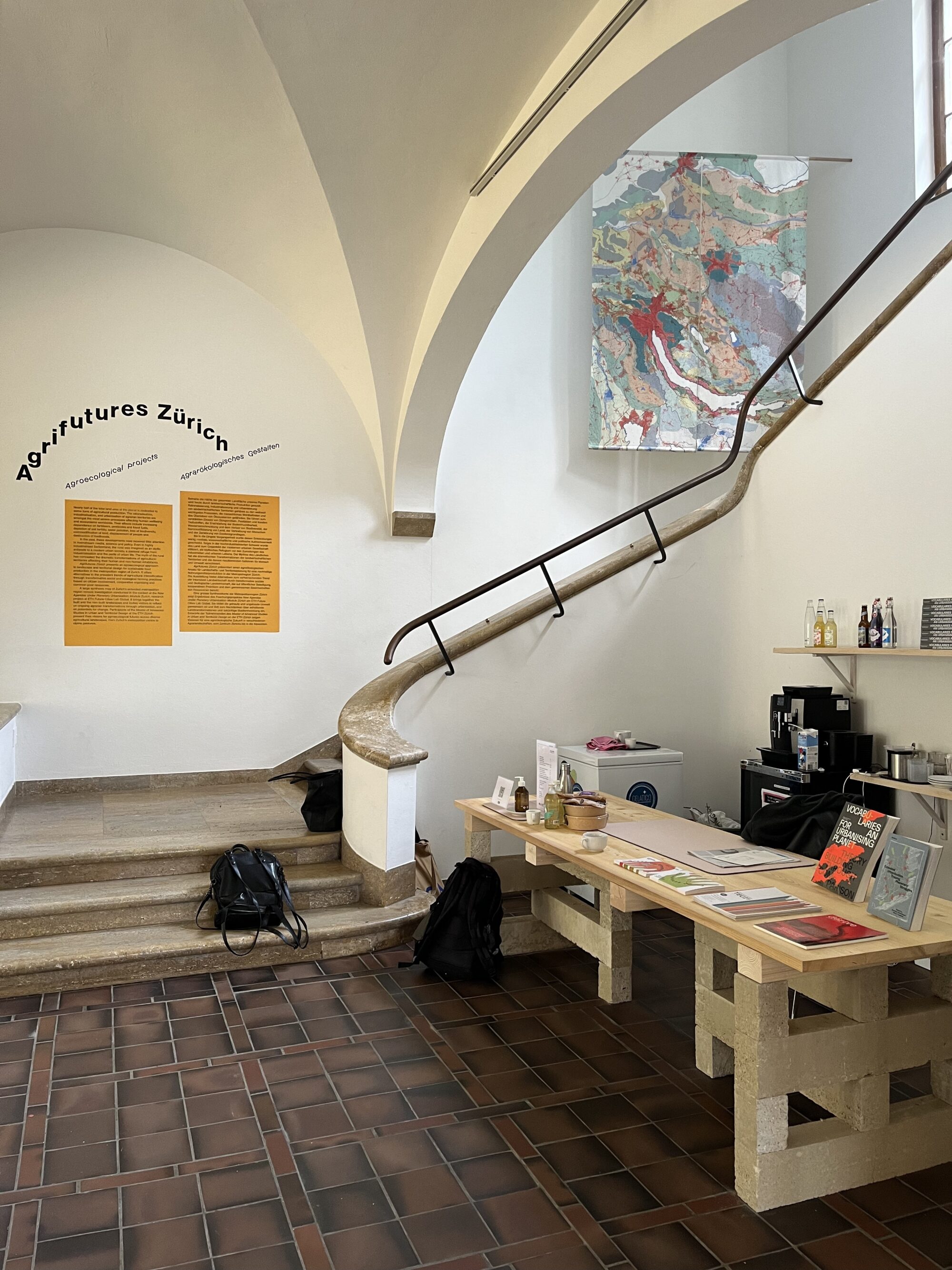
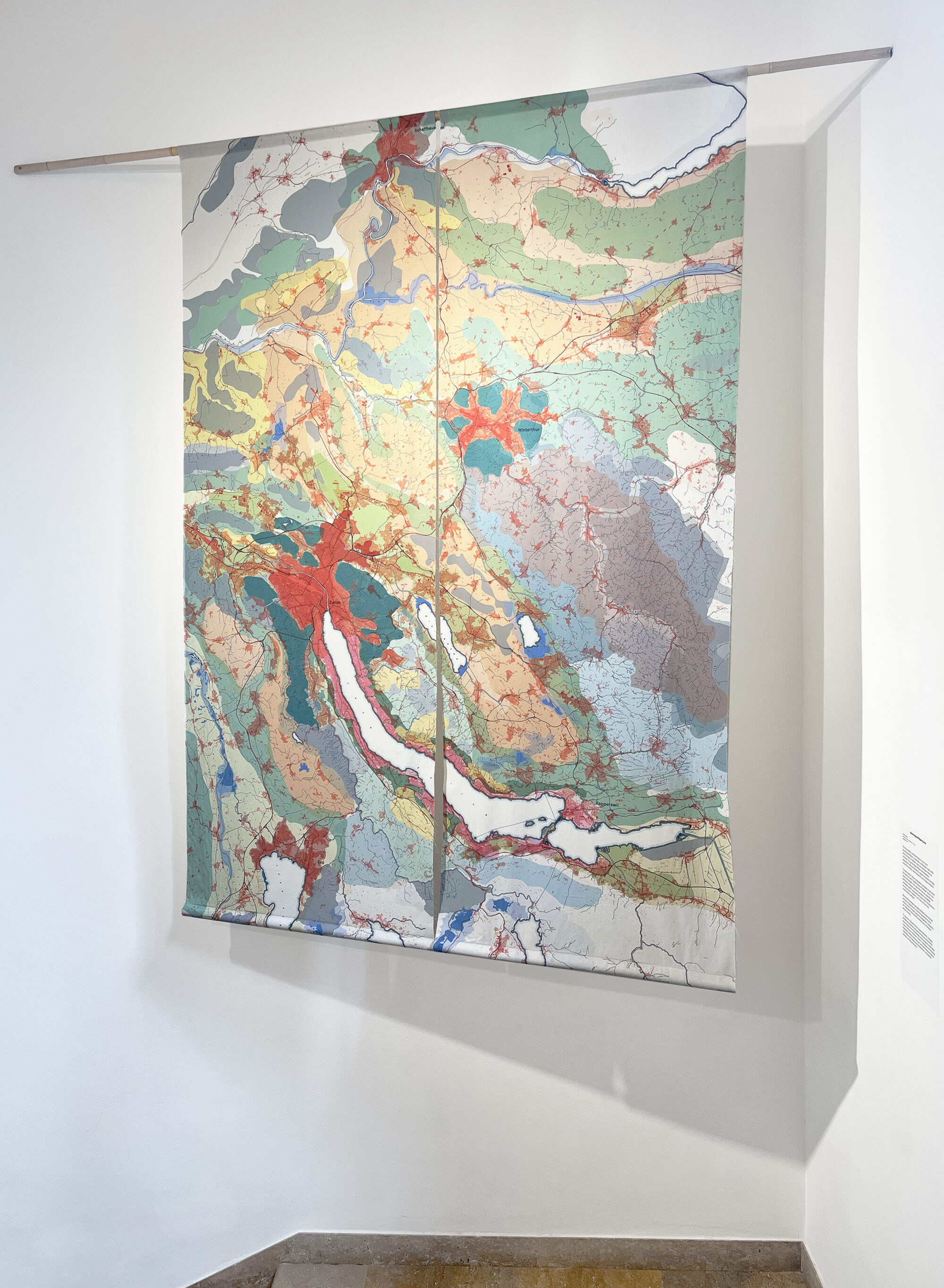
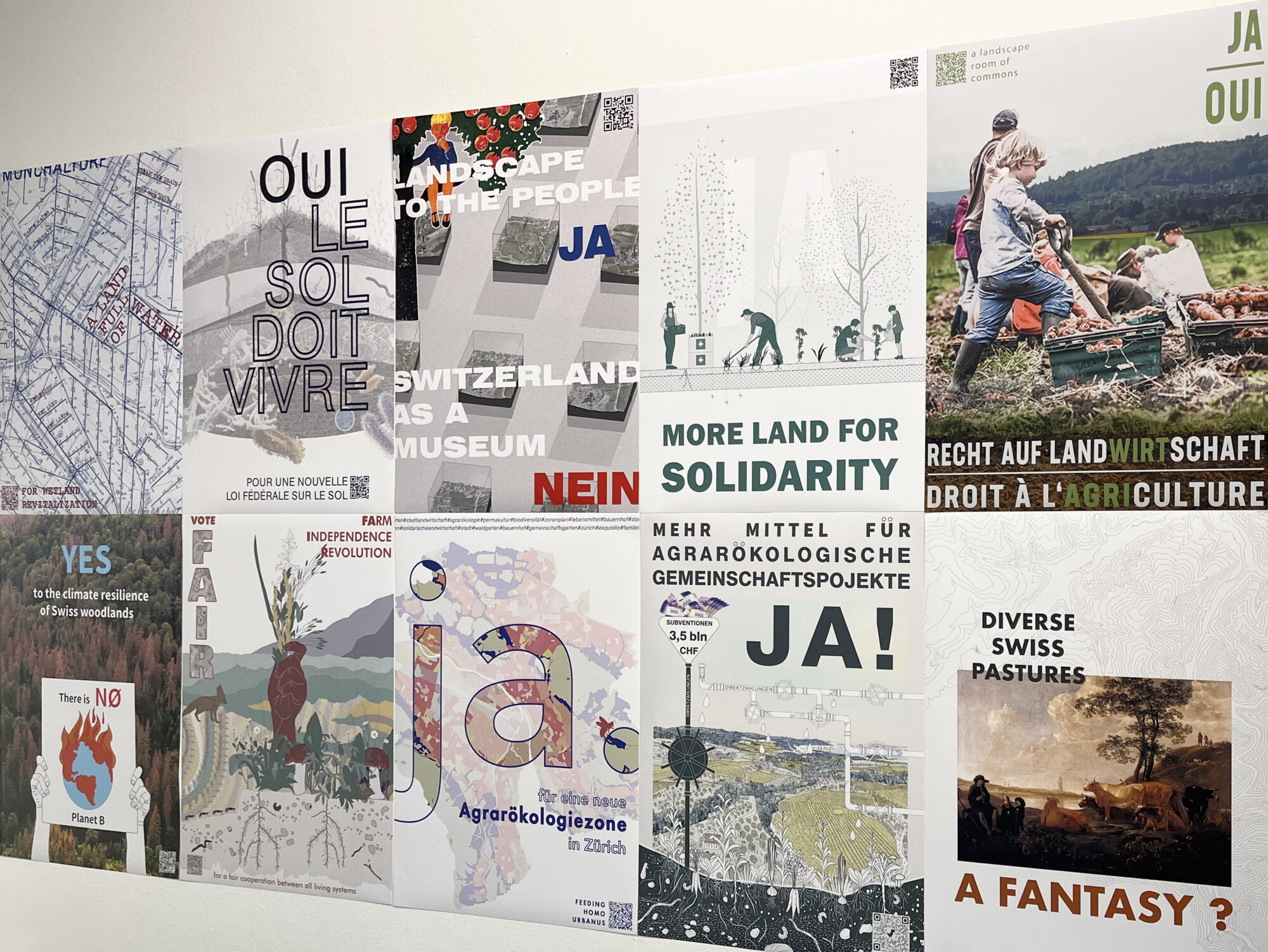
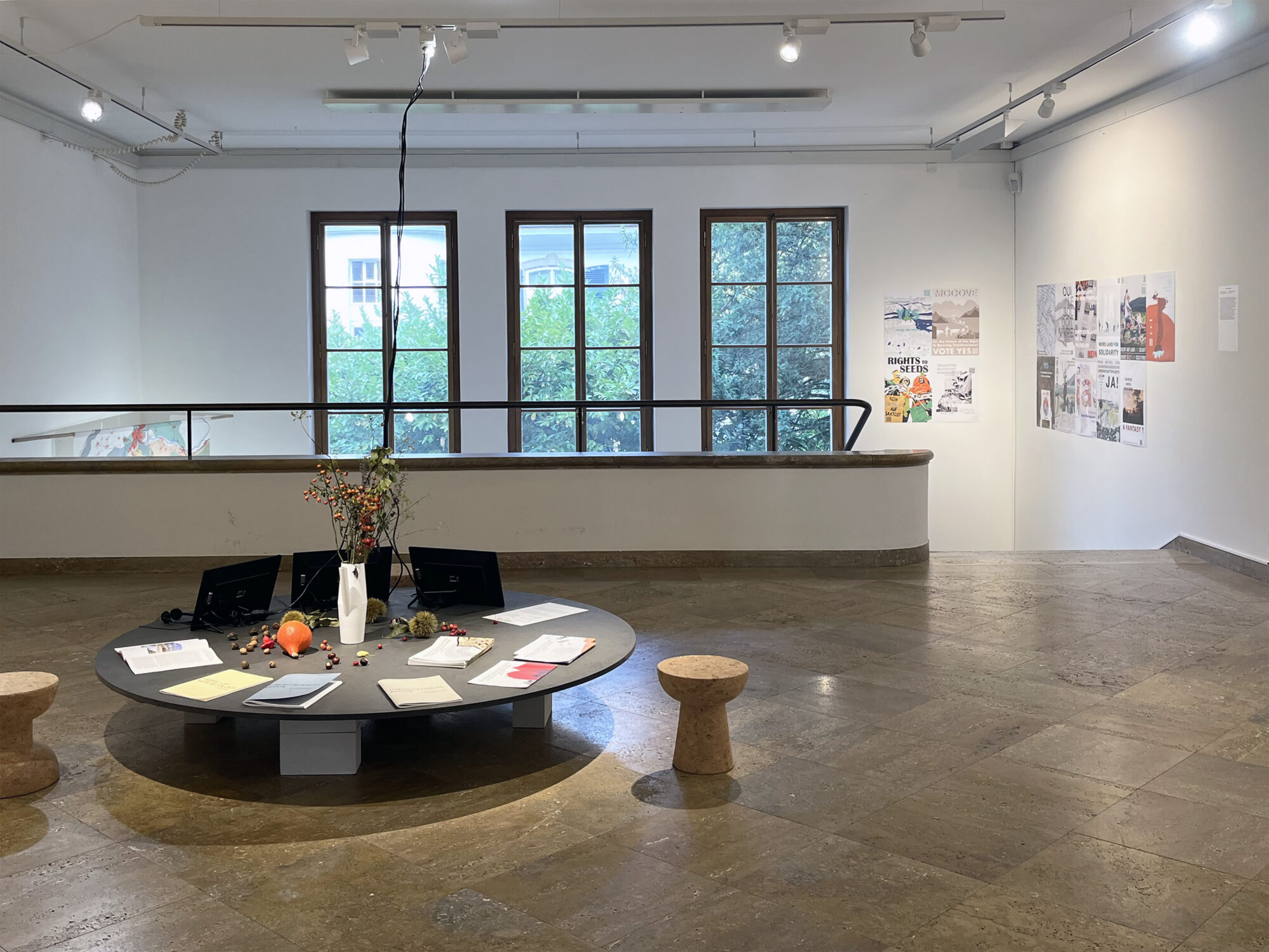
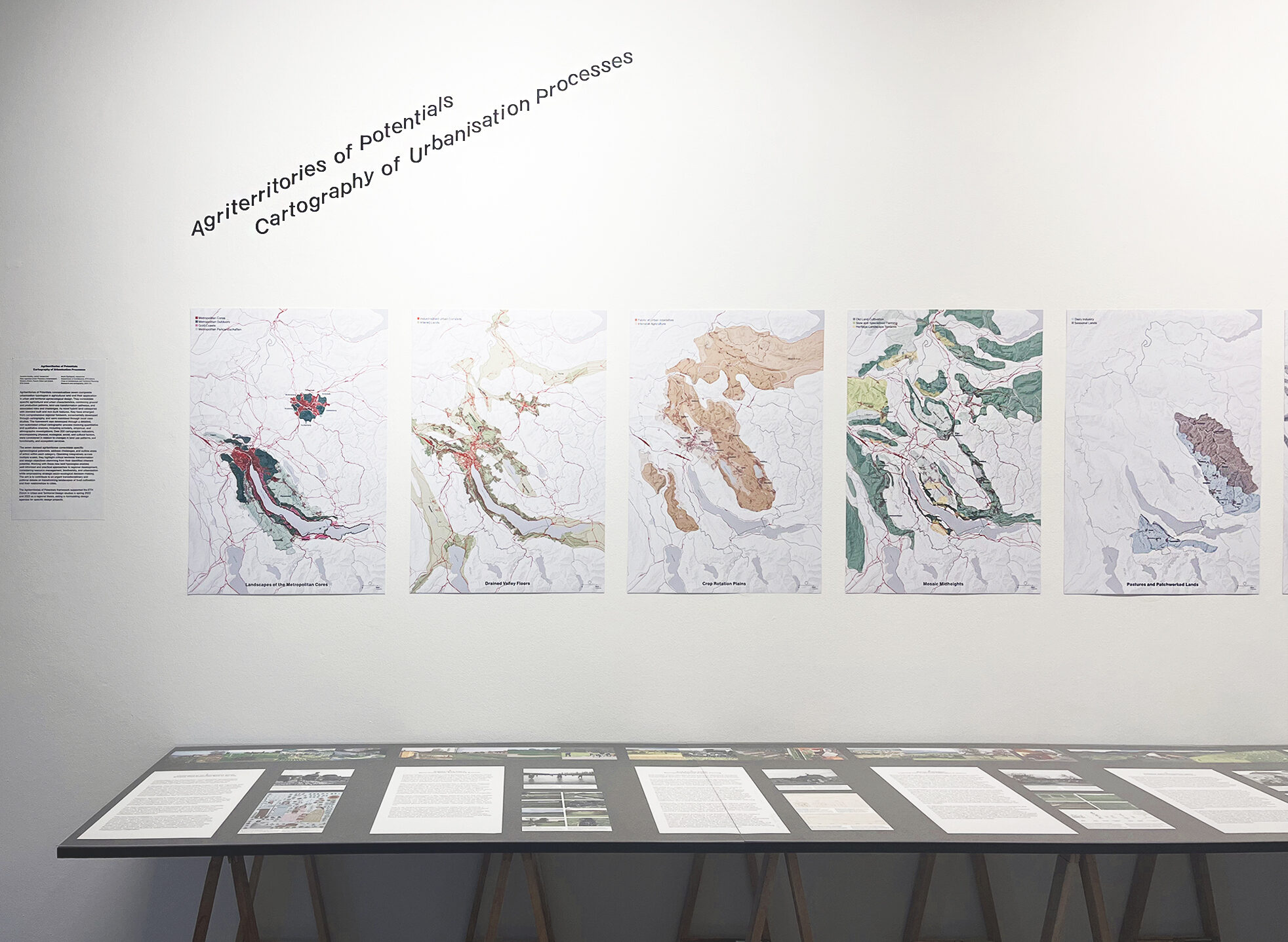
Seven distinct “Agriterritories of Potentials” comprise the Agroecological Region of Zurich, where we propose consolidating specific agricultural and urban fabric characteristics, soil and production patterns, and urban and land-use transformation pathways. © Karoline Kostka and Muriz Djurdjević, 2020-2023.
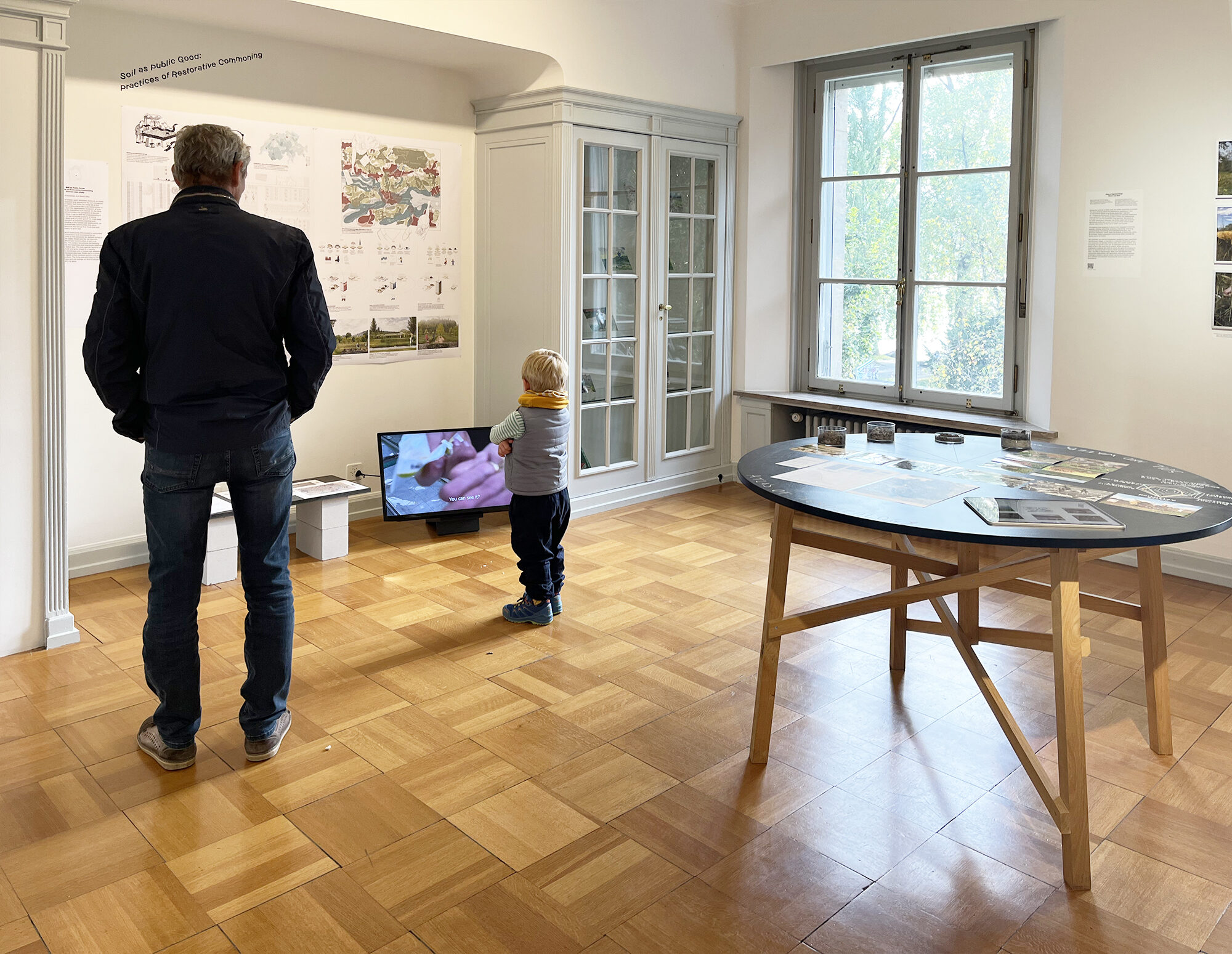
"Soil as Public Good" studies practices of restorative land commoning in Glatttal. © Ece Emanetoglu and Nadia Nika 2022.
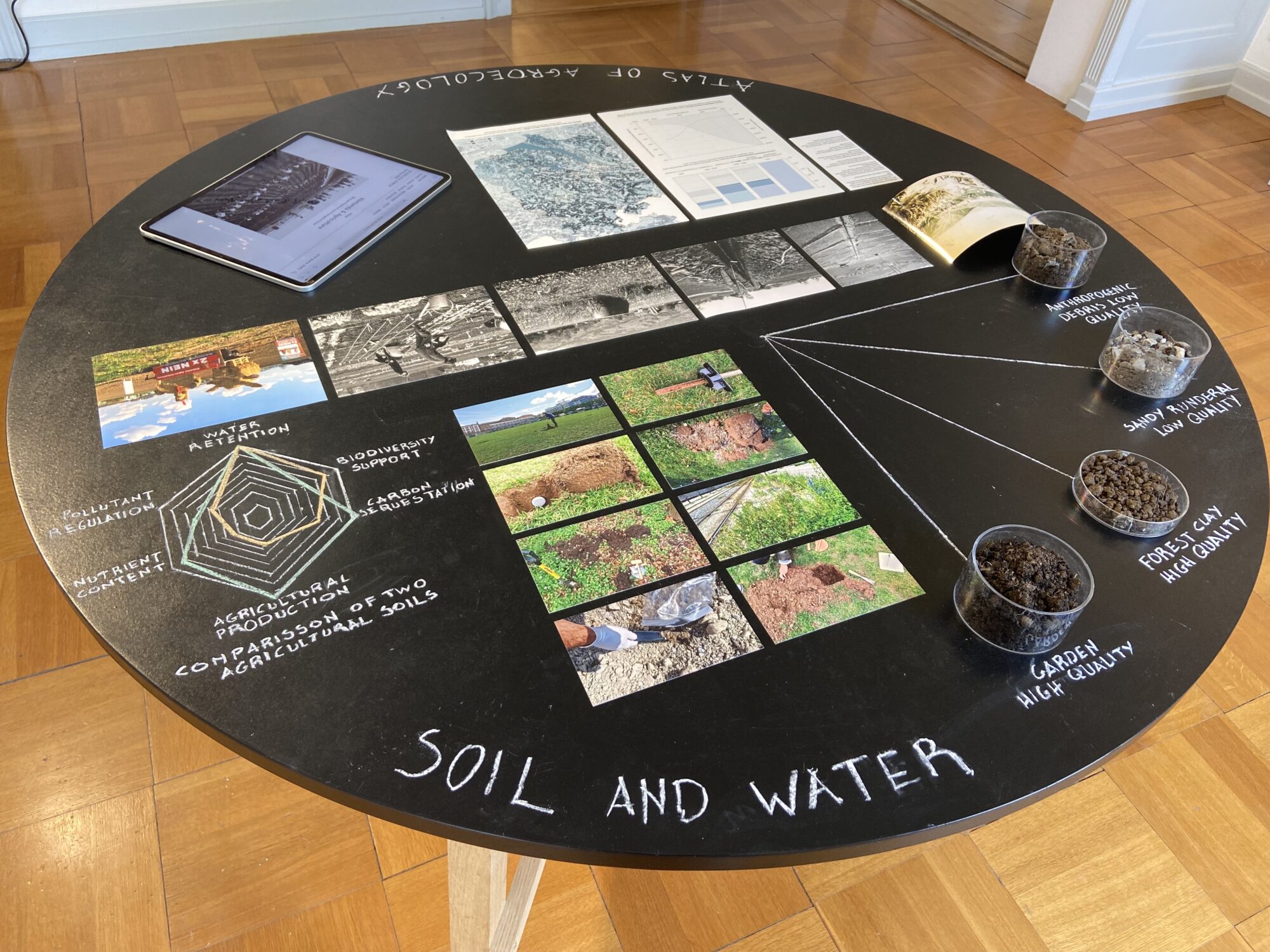
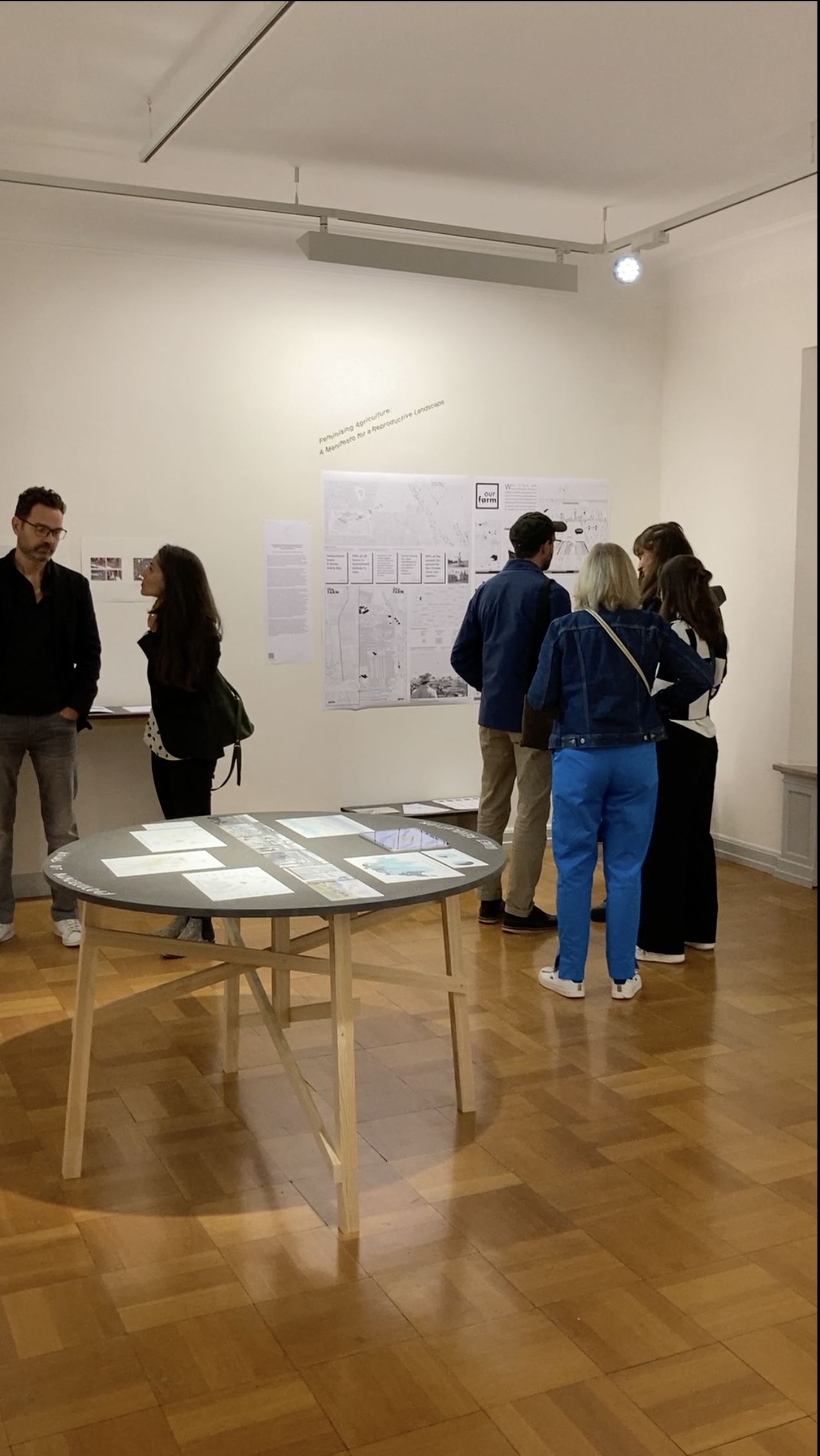
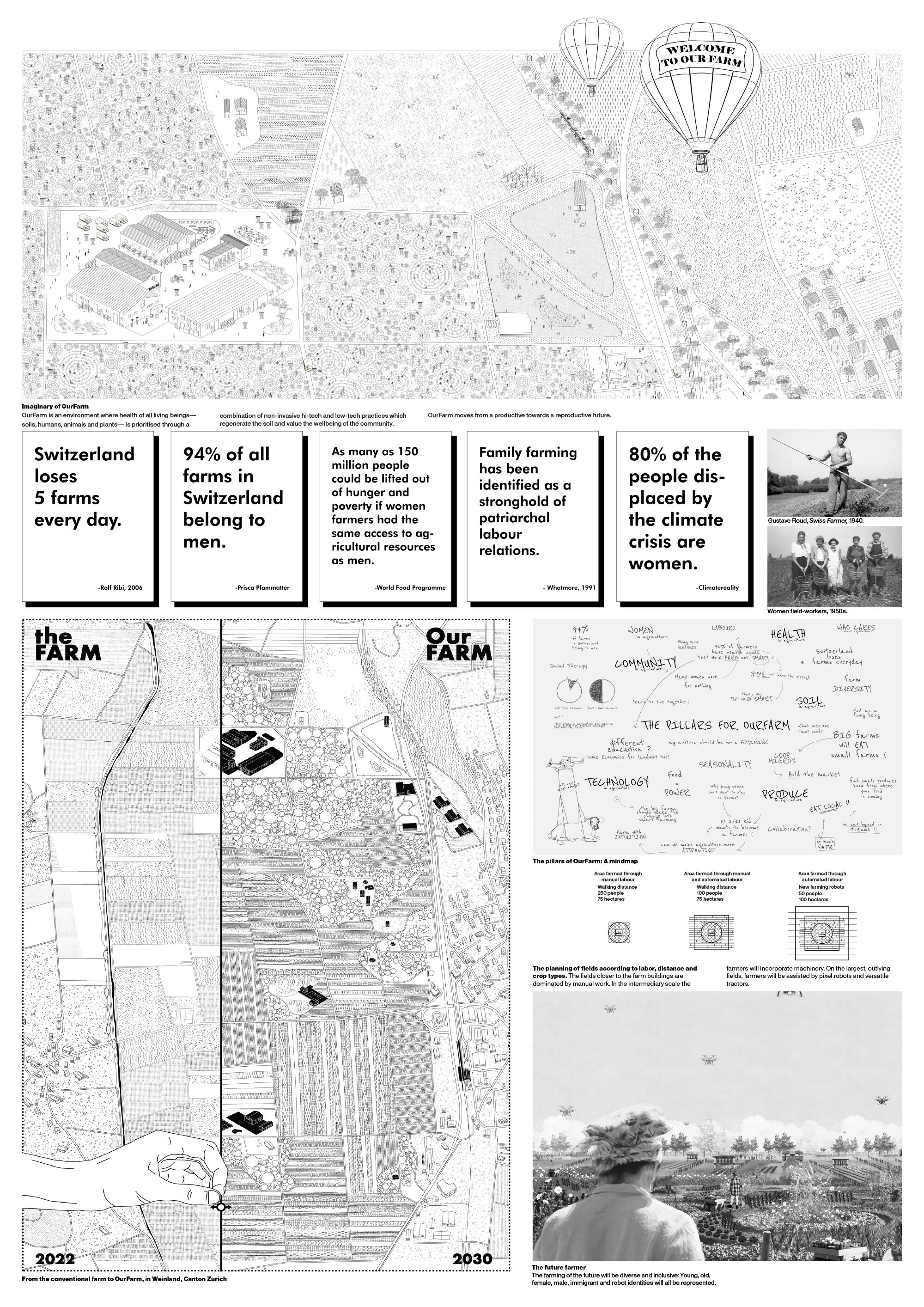
"Feminising Agriculture" argues that farms (currently 94% male-owned, according to the authors' calculations) could function differently if women owned them. © Vasiliki Bali, Georgia Drakou, Nathalie Peeters, 2022.
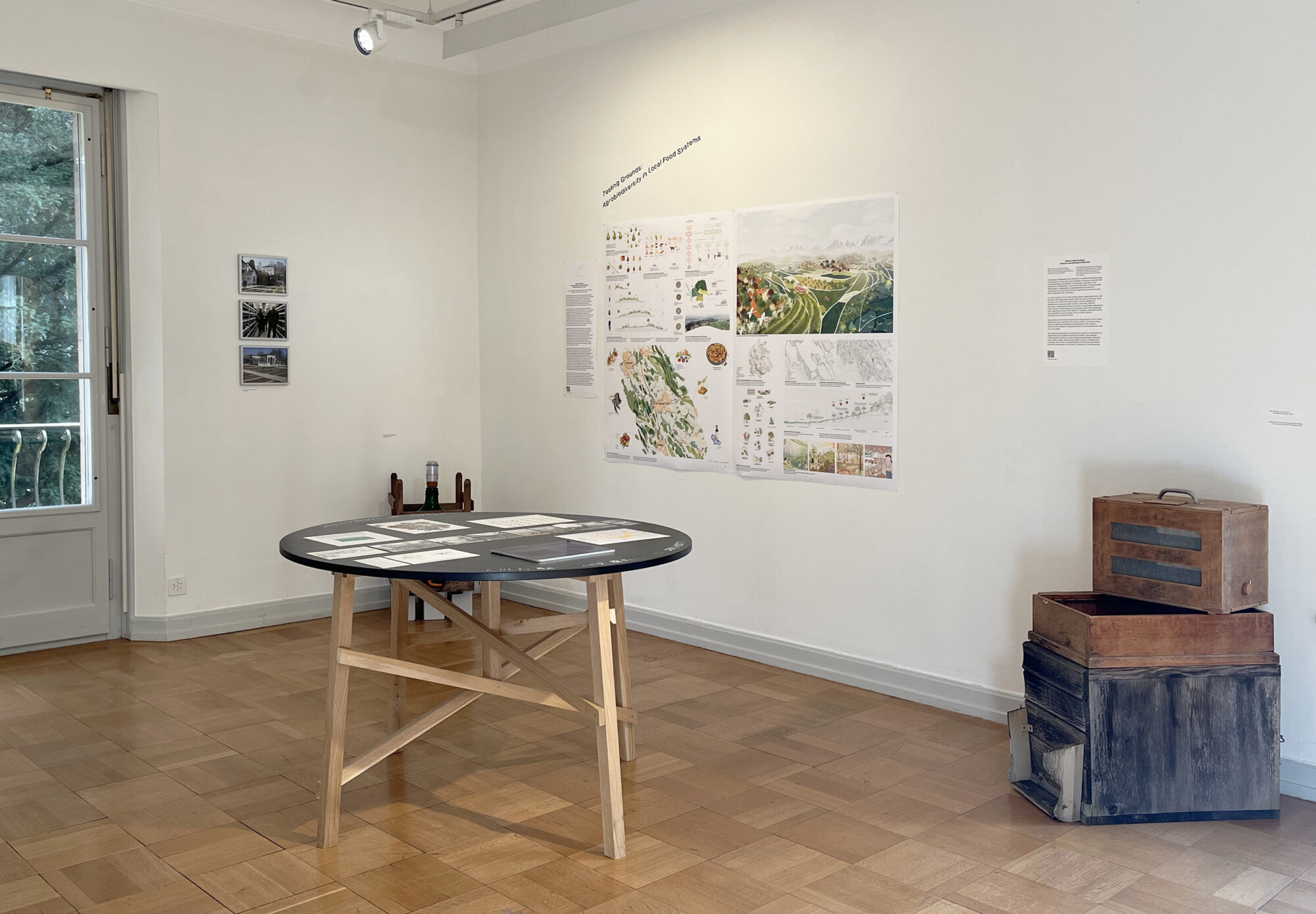
"Tasting Grounds" investigates genetic and social diversity conservation in Midheights around Knonauer Amt. © Xiang Lin, Nabila Larasati Pranoto, Maria Jose Castañeda Valbuena, and Emma Kaufmann LaDuc 2023.
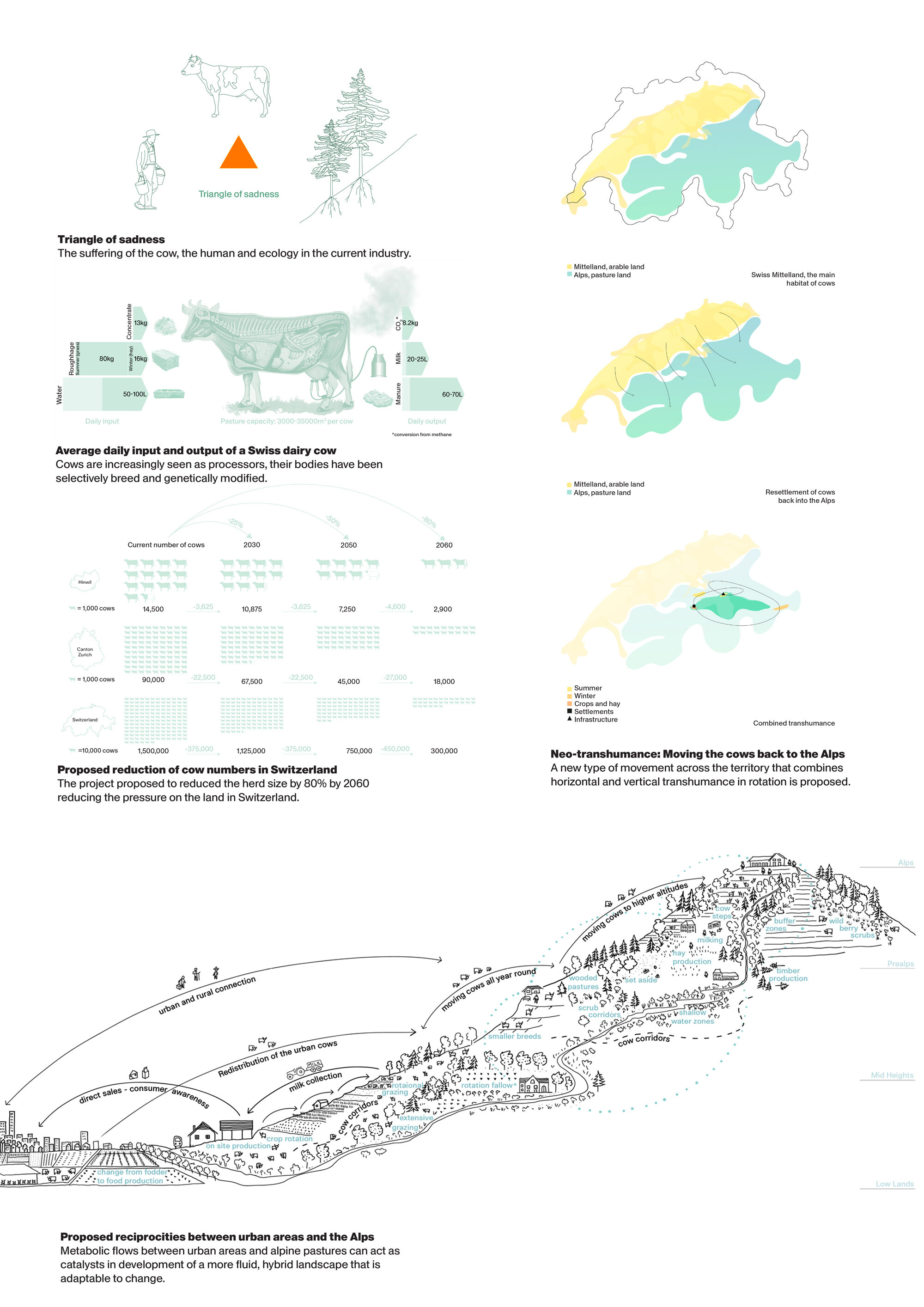
"The Milky Way" proposes an ecological change in dairy farming: the industrial cow husbandry in the Central Plateau would be exchanged with cows that are distributed throughout the Prealps and the Alps in a way that the community and the animals, instead of trampling on the terrain, could also take care of it. © Elvira Kinzner, Ji Min An, and Thomas Gruber, 2023.
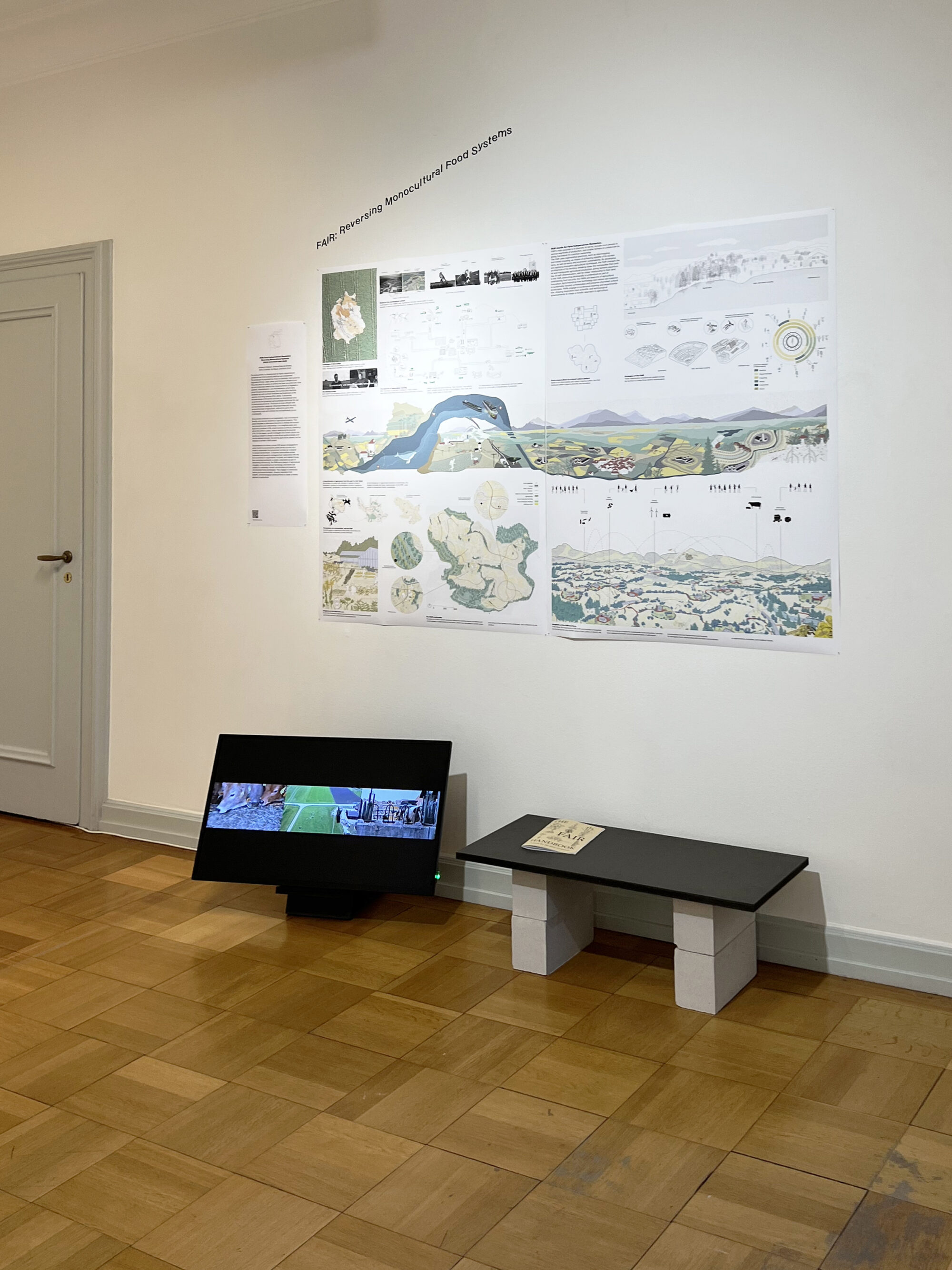
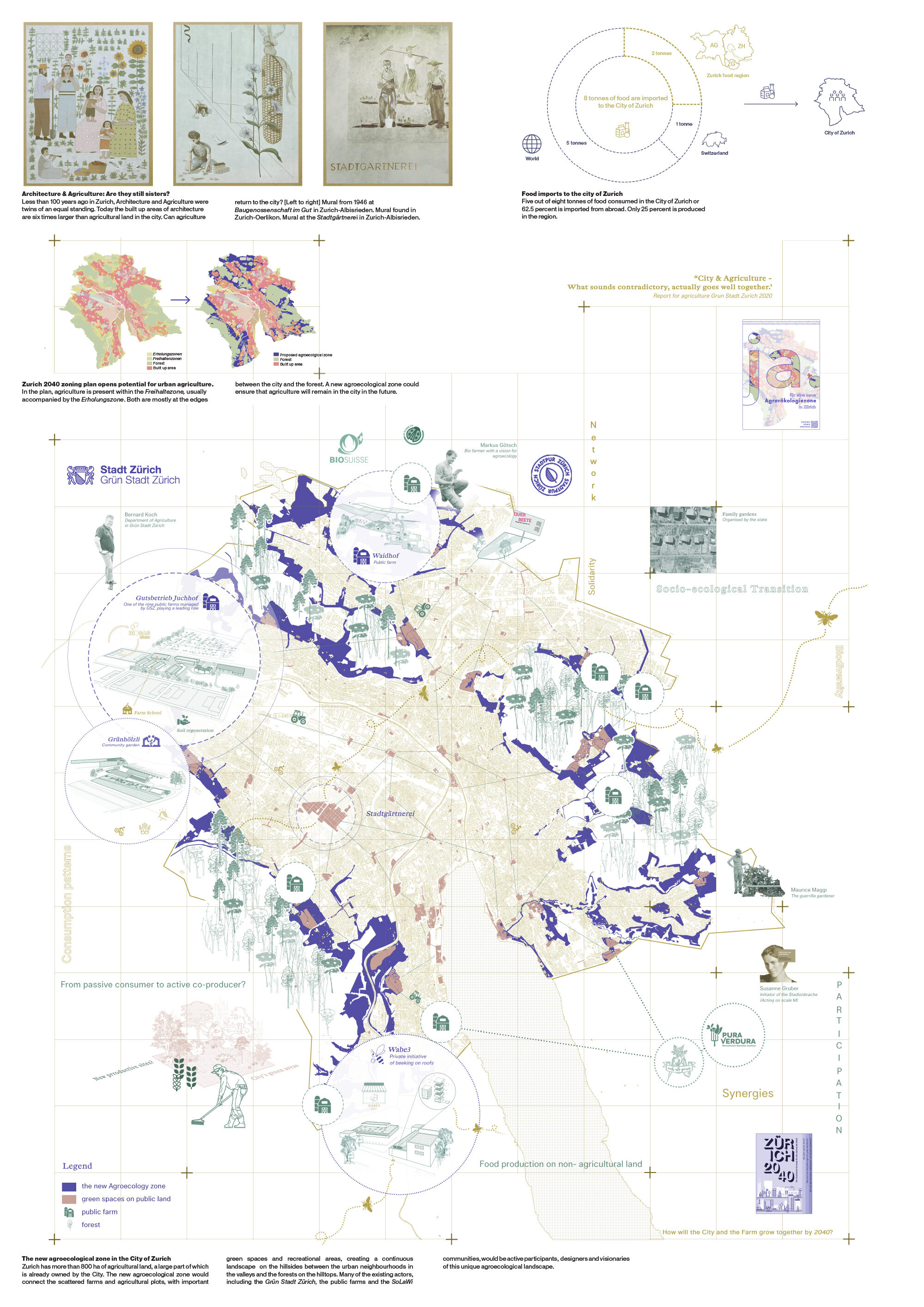
"Feeding Homo Urbanus" explores the current recreational zones of the city as a possible Agroecological zone that would embrace urban farming. © Petra Pfaff, Loukia Deli, 2022.
Territorial Project for Agroecological Change
Until recently, the potential of agriculture within a territorial project has hardly been examined within landscape and urban studies. However, researchers and designers are increasingly working together across disciplinary boundaries to address agricultural practices which have become deeply unsustainable. Studies have shown that in the region of Zurich biodiversity is higher in core urban areas than in the landscapes of industrialised agriculture. As part of a globalised food system, the Zurich region displays high reliance on food, fodder imports and on migrant agricultural labour. These and other contradictions have prompted researchers and designers to address the social and metabolic links among the territories of food production and consumption, and to propose a paradigm shift in both urban strategies and agricultural policies.
The exhibition presents agroecological design approaches for the metropolitan region of Zurich. The fourteen design projects, developed at the ETH Zürich by the participants of the Master of Advanced Studies in Urban and Territorial Design (MAS UTD) during the academic years 2021/22 and 2022/23, are probing alternatives to move us towards a regional food culture, higher food self-sufficiency and climate resilience. They argue for better care for soils, waterbodies and biodiversity, for democratisation of food production and distribution, and for human and ecosystem-centred technologies in agriculture.
The MAS UTD offers experimental and transdisciplinary design studios at urban and territorial scales and transdisciplinary courses on regenerative landscape practices, urban ecology, planetary urbanisation, postcolonial thought and agrarian questions.
| Location | Metropolitan Region Zürich |
| Date | 2020-2024 |
| Projects | Agrarian Change and Agroecological Transitions at ETH Future Cities Lab Global at the Singapore-ETH Centre and the joint ETH Zürich / EPFL Master of Advanced Studies in Urban and Territorial Design |
| Team | The MAS UTD programme at ETH Zürich is offered through interdisciplinary collaboration by the Chair of Architecture and Territorial Planning, Department of Architecture, ETH Zürich, Prof. Milica Topalović, Alice Clarke, Dr Nancy Couling, Muriz Djurdjević, Vesna Jovanović, Karoline Kostka, and Dr Nazli Tümerdem; Chair of Being Alive, Department of Architecture, ETH Zürich, Prof. Teresa Galí-Izard, Bonnie-Kate Walker, Stefan Breit; Chair of Urban Sociology, Department of Architecture, ETH Zürich, Prof. Dr Christian Schmid and Nitin Bathla; and Department of Environmental Systems Science, ETH Zürich, P.D. Dr Christoph Kueffer. |